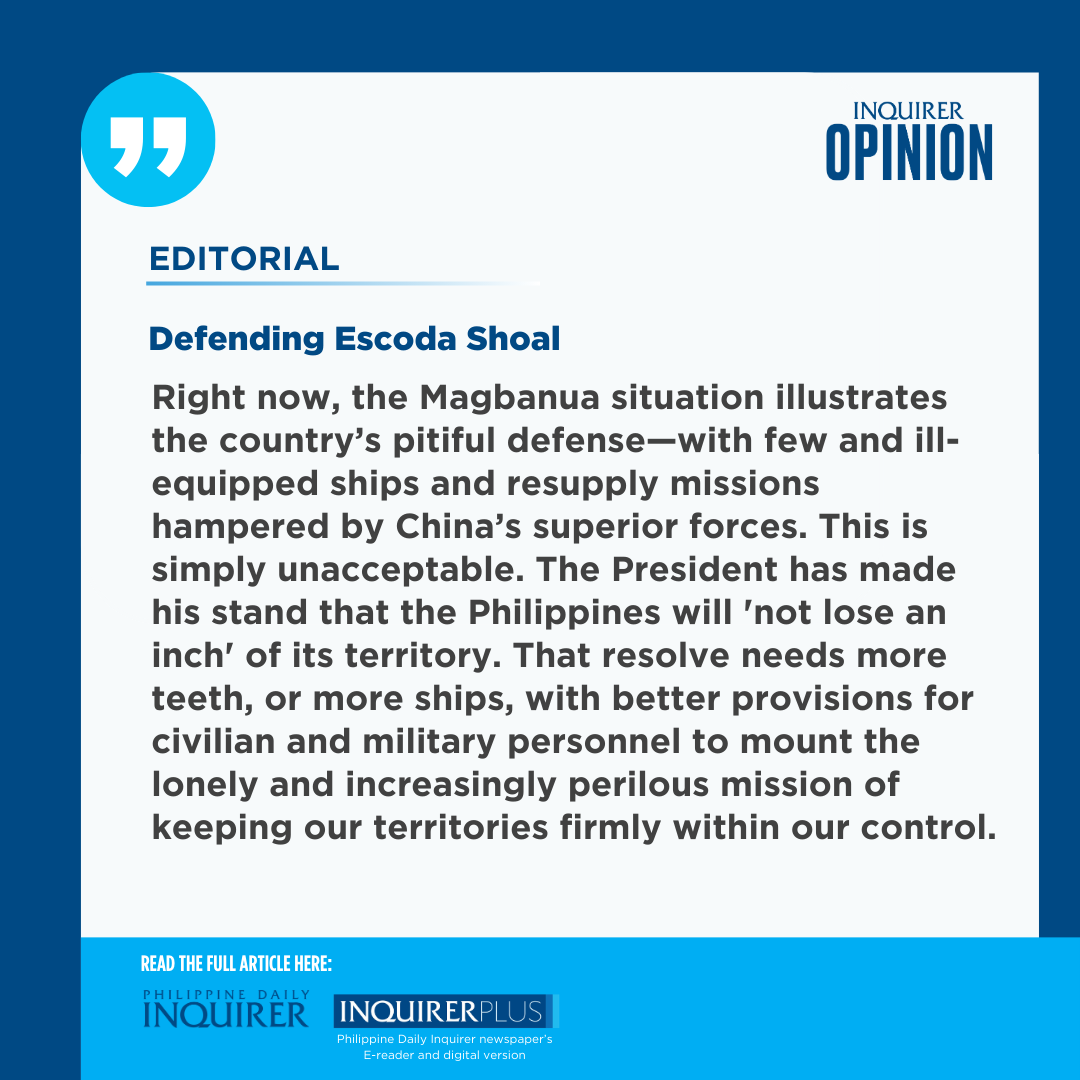That the Philippine Coast Guard (PCG) finds itself having to profusely explain the pullout of the besieged BRP Teresa Magbanua after five months of heroic defense of Escoda Shoal in the West Philippine Sea (WPS) is like rubbing salt on an open wound.
With some of its crew carried out on stretchers when the ship docked in Puerto Princesa, Palawan, on Sunday, it is clear the crew had done more than what is humanly possible to perform their duty at the risk of sickness, starvation, and even death. No one can ask them to endure more. With provisions for its crew running low and the ship sustaining critical damage when a Chinese coast guard vessel rammed it on Aug. 31, Magbanua’s recall is inevitable.
And yet the PCG’s justification and assurance that Magbanua’s recall was temporary has been necessitated by the prevailing perception that the pullout is symbolic of the Philippines’ retreat from the contested shoal amid China’s aggressive demands.
It did not help that the pullout came after top Philippine and Chinese foreign affairs officials met in Beijing last week for the Bilateral Consultation Mechanism intended to defuse tensions in the WPS.
Self-serving narrative
The Department of Foreign Affairs, in a statement on the meeting, said DFA Undersecretary Ma. Theresa Lazaro and Chinese Vice Foreign Minister Chen Xiaodong exchanged “frank and candid views” on the Escoda Shoal dispute.
“Emphasizing that Escoda Shoal is within the exclusive economic zone (EEZ) of the Philippines, Undersecretary Lazaro reaffirmed the consistent position of the Philippines and explored ways to lower the tension in the area,” the DFA said.
Despite that, China remains adamant in its claim that Magbanua was “illegally stranded” and should be removed from what it claims to be part of Chinese territory. Following the pullout, China’s coast guard stated its self-serving narrative that the Philippines had “evacuated” its ship from Escoda Shoal.
PCG spokesperson Commodore Jay Tarriela took pains to point out that the pullout had nothing to do with Beijing’s demand during the meeting.
“The decision of the commandant of PCG, Adm. Ronnie Gil Gavan, to pull out Magbanua is a decision that he made because of the welfare of the [crew], the seaworthiness of the vessel, and the most compelling factor obviously [being] the bad weather conditions,” Tarriela said.
Bitter lesson
As well, the PCG official stressed that “[w]e have not lost anything. We did not abandon anything. Escoda Shoal is still part of our exclusive economic zone.”
On Monday, the National Maritime Council (NMC) said that another PCG vessel was on its way to Escoda Shoal to replace Magbanua. This was in line with President Marcos’ directive to ensure that the Philippines maintains its presence at the shoal amid concerns over the pullout of Magbanua, NMC spokesperson Alexander Lopez said.
Sending another ship to Escoda Shoal would certainly be in the country’s interest, and will help correct the perception that the Philippines blinked in its dispute with China.
Such concerns are understandable given the bitter lesson of the 2012 standoff in Scarborough Shoal when the Philippines withdrew its ships following a supposed agreement with China. China, however, did not pull out its vessels and eventually cordoned off and occupied Scarborough Shoal.
Credible defense
The Philippines did win the WPS dispute when the arbitration court ruled against China’s sweeping claims in 2016, but Beijing has refused to accept the decision.
It is thus imperative for the Philippine government to ensure that Scarborough won’t happen again, as experts have warned that losing the strategically located Escoda Shoal could lead to the loss of other important features within the Philippine EEZ to China’s control.
“China’s coercive tactics are designed to break our will and compel us to give up our interests, not only in Sabina Shoal, but in Second Thomas Shoal, Reed Bank, and other features. Unless we break this habit for the purpose of de-escalation, we will lose the West Philippine Sea by default,” warned retired Navy rear admiral Rommel Jude Ong.
With China playing the long game, the Philippines must clearly fortify its defense capabilities if it were to mount a credible defense of its vast territories in the resource-rich waters. It cannot just rely on expressions of support from western allies pending an incident that would require intervention from the United States under the Mutual Defense Treaty.
Right now, the Magbanua situation illustrates the country’s pitiful defense—with few and ill-equipped ships and resupply missions hampered by China’s superior forces. This is simply unacceptable.
The President has made his stand that the Philippines will “not lose an inch” of its territory. That resolve needs more teeth, or more ships, with better provisions for civilian and military personnel to mount the lonely and increasingly perilous mission of keeping our territories firmly within our control.
